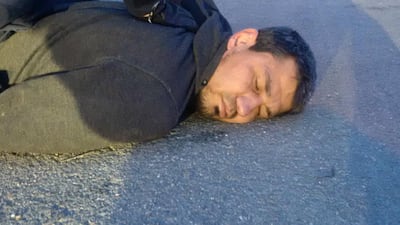An Uzbek asylum seeker who admitted carrying out a lorry attack in Stockholm last year that killed five people planned his assault "against infidels" in Sweden for months, prosecutors said on Tuesday.
Rakhmat Akilov, 39, who swore allegiance to ISIL, admitted stealing a lorry and mowing down a crowd of pedestrians on a Friday afternoon in April.
Prosecutors formally charged him on Tuesday with “terrorism and attempted terrorism”.
Akilov wanted to “instigate fear among the public in Sweden and force its government and parliament to end Sweden’s participation in military training of the global coalition against ISIL in Iraq,” the charges said.
ISIL has, however, not claimed responsibility for the attack.
Arrested a few hours after the assault thanks to video surveillance images, Akilov confessed to police the next day.
The prosecution said it would present as evidence excerpts of Akilov’s chat conversations concerning his “willingness to carry out a terror attack” and his “desire to join IS”.
In one chat, he asked for help “to carry out a crime, he wanted to run down infidels (because) Sweden supports Nato and sends bomb technicians to Iraq and train Kurds,” the indictment read.
Prosecutors, who will argue Akilov acted alone, will also present two videos recorded on the eve of the attack in which he swore allegiance to ISIL.
It was still not known why Akilov became radicalised, but “he wasn’t radicalised right before the attack,” prosecutor Hans Ihrman said.
The prosecution plans to present as evidence Akilov's chat texts dating to January 2017, photos of the area taken with his smartphone before the killings and internet searches for targets and bomb materials on his computer.
After crashing the lorry into the facade of a department store, Akilov set off an explosive device in the cab of the vehicle made up of five butane canisters, screws, knife blades and metal objects, causing damage to the lorry but no injuries, prosecutors said.
He then fled the scene.
“His motive was to punish Sweden for its participation in the war against IS,” Mr Ihrman said.
Akilov's lawyer, Johan Eriksson, said his client would explain his motives during the trial.
“He admits committing a terrorist act” and "admits that he should be convicted” and expelled from Sweden after serving his sentence, Mr Eriksson said, adding that Akilov had not expected to survive the attack.
“He thought he would be shot or would die.”
The Stockholm district court said the trial would start on February 13.
Akilov faces a life sentence if convicted.
A construction worker, Akilov had gone underground after his application for Swedish residency was rejected in 2016, police said last year.
Three Swedes, including an 11-year-old girl, a 41-year old British man, and a 31-year-old Belgian woman were killed in the attack. Ten others were injured.
Similar assaults with vehicles have taken place in Europe in recent years, including Berlin, London, and the southern French city of Nice, where 86 people were killed and more than 400 were injured on July 14, 2016.
That attack was claimed by ISIL.

